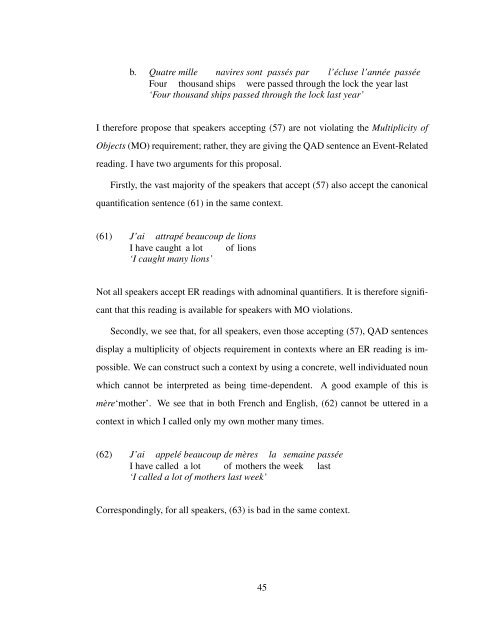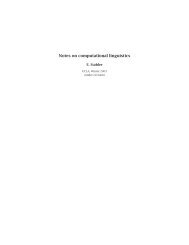Formal Approaches to Semantic Microvariation: Adverbial ...
Formal Approaches to Semantic Microvariation: Adverbial ...
Formal Approaches to Semantic Microvariation: Adverbial ...
You also want an ePaper? Increase the reach of your titles
YUMPU automatically turns print PDFs into web optimized ePapers that Google loves.
. Quatre mille navires sont passés par l’écluse l’année passée<br />
Four thousand ships were passed through the lock the year last<br />
‘Four thousand ships passed through the lock last year’<br />
I therefore propose that speakers accepting (57) are not violating the Multiplicity of<br />
Objects (MO) requirement; rather, they are giving the QAD sentence an Event-Related<br />
reading. I have two arguments for this proposal.<br />
Firstly, the vast majority of the speakers that accept (57) also accept the canonical<br />
quantification sentence (61) in the same context.<br />
(61) J’ai attrapé beaucoup de lions<br />
I have caught a lot of lions<br />
‘I caught many lions’<br />
Not all speakers accept ER readings with adnominal quantifiers. It is therefore significant<br />
that this reading is available for speakers with MO violations.<br />
Secondly, we see that, for all speakers, even those accepting (57), QAD sentences<br />
display a multiplicity of objects requirement in contexts where an ER reading is impossible.<br />
We can construct such a context by using a concrete, well individuated noun<br />
which cannot be interpreted as being time-dependent. A good example of this is<br />
mère‘mother’. We see that in both French and English, (62) cannot be uttered in a<br />
context in which I called only my own mother many times.<br />
(62) J’ai appelé beaucoup de mères la semaine passée<br />
I have called a lot of mothers the week last<br />
‘I called a lot of mothers last week’<br />
Correspondingly, for all speakers, (63) is bad in the same context.<br />
45
















